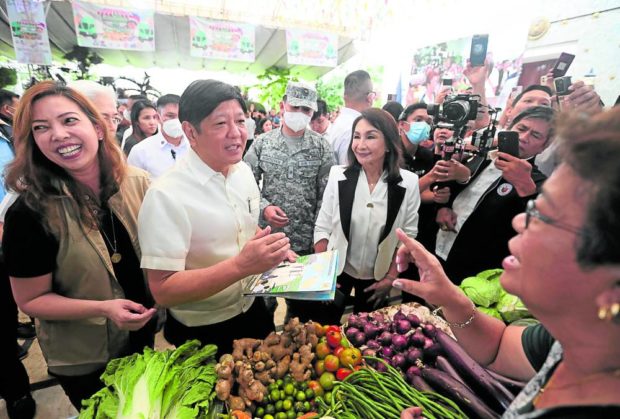
‘KADIWA NG PANGULO’ | President Ferdinand Marcos JR. talks to a vendor during a visit to the Kadiwa caravan set up at the Cebu provincial capitol grounds on Monday, Feb. 27, 2023. (Photo by MARIANNE BERMUDEZ / Philippine Daily Inquirer)
CEBU CITY, Cebu, Philippines — In his first visit here since he assumed office on June 30 last year, President Ferdinand Marcos Jr. on Monday said the Kadiwa stores nationwide would be the government’s response to the food crisis and the rising prices of goods in the country.
During the launch of the Kadiwa ng Pangulo at the provincial capitol here, the President said the government would increase the Kadiwa stores across the country where consumers could buy agricultural products and other goods at a cheaper price.
First launched in this city, the president said the Kadiwa ng Pangulo is an extension of the Kadiwa ng Pasko, which started last year.
The Kadiwa program is a farm-to-consumer market chain that eliminates intermediaries, allowing local producers to have higher income by selling their produce directly to consumers.
“We will continue to do this to ease the burden of our people,” Mr. Marcos said in his speech.
At the Kadiwa stalls here, vendors said the price of onion is at P190 compared to the P300 in local markets while garlic only costs P90, down from more than P100 per kilo.
P25 per kilo rice
Consumers can also buy rice for as low as P25 per kilo.
“It is important that we expand this, especially in places where prices of goods are still high, especially in the markets,” Mr. Marcos said.
He said there were already 500 Kadiwa stalls nationwide since its launch last year.
In an interview with reporters here, Agriculture Assistant Secretary Kristine Evangelista said the national government would work closely with local governments to make the Kadiwa stores sustainable.
“We will look at the turnout of the food traffic and see what commodities are still needed,” Evangelista said.
Asked about the government’s long-term plan to lower prices of goods, he said the Department of Agriculture has the Kadiwa Food Market Mobilization.
“This will definitely capacitate more cooperatives to be able to consolidate more products. We are talking about economies of scale here,” she said. “We see that traders are capable of consolidating metric tons and they can dictate the prices as well,” she added. “Giving that capacity to our farmers, then we can protect the prices from the farm gate to consumers.”
Housing project
On Monday afternoon, the President also distributed livelihood and financial assistance to qualified beneficiaries in the city at the Mandaue Sports Complex.
Mr. Marcos also visited Cebu to inaugurate a government project that would provide 30,000 housing units to poor and low-wage earners in the city. The President, together with Speaker Martin Romualdez, Housing Secretary Jose Rizalino Acuzar, and Cebu Gov. Gwendolyn Garcia, led the inauguration of the initial phase of the Cebu City South Coastal Urban Development Project, which will have 10 20-storey buildings within the 25-hectare development site.
The housing project in Alumnos, Basak San Nicolas, Cebu City, is part of the government’s Pambansang Pabahay Para sa Pilipino Program.
In an interview with reporters, Mr. Marcos said the government is now close to providing 600,000 housing units to qualified individuals.
“Our target is one million a year. We will do everything to achieve that. If we don’t reach that this year, we will speed up next year so that we can have an average of one million a year,” he added.